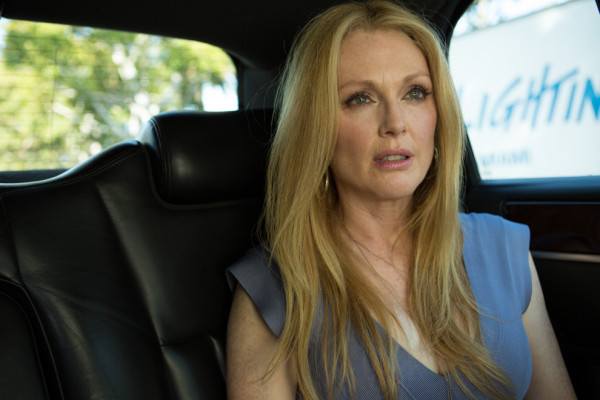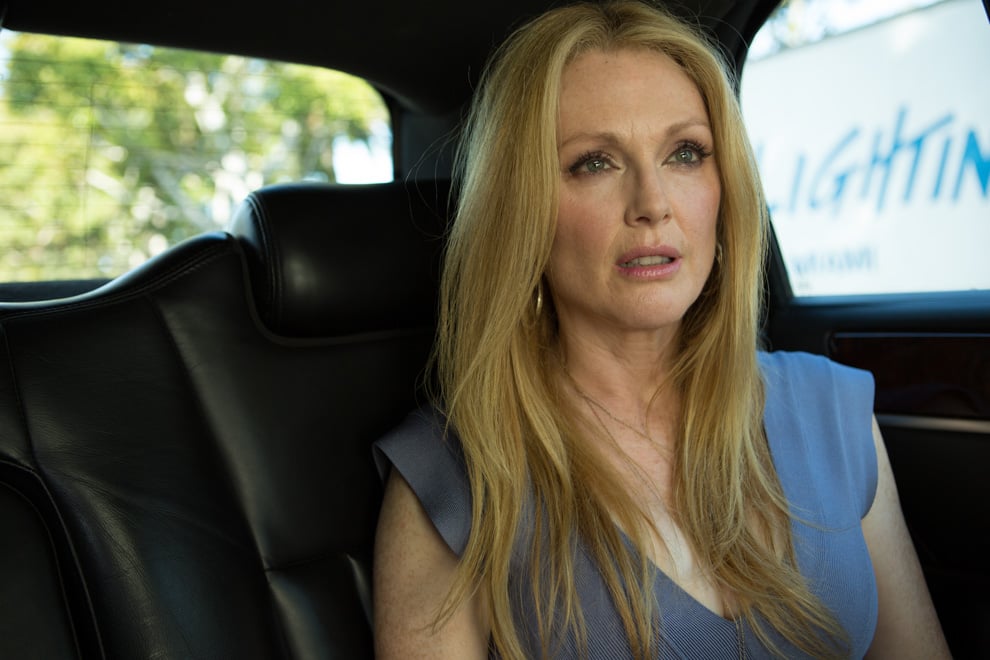
With “Maps to the Stars,” Canadian David Cronenberg has made his first L.A.-set production, a black-comedy so caustic in its critique of Hollywood that it wouldn’t be surprising if he never returns to Tinseltown. A sprawling mess of intersecting plotlines, “Map to the Stars” is never less than entertaining. Driven by great direction, superb acting and a script that can be quite funny — if you are the type to laugh at the most horrendous of things — Cronenberg’s latest is an intriguing work of biting satire.
In the stronger of two plotlines, a young ingénue named Agatha (Mia Wasikowska), fresh off the bus from the middle of nowhere (Florida), becomes the personal assistant to the aging celebrity Havana Segrand. Segrand, played by Julianne Moore, is the child of an abusive actress with an intense desire to star in a remake of one of her mother’s most celebrated films. Then there’s Jerome Fontana (Robert Pattinson), a limo-driver/struggling writer/struggling actor whose work brings him in contact with both Agatha and Segrand.

Cronenberg has assembled an excellent group of actors to deconstruct celebrity culture. Segrand is a vain narcissist, but Moore understands the reasons behind Havana’s flaws. She only wants approval, and she desperately seeks it from every Hollywood lowlife she encounters. It’s heartbreaking — Havana has never moved beyond being a child because her childhood was taken from her by a mother who simply could not love her. Wasikowska’s Agatha, on the other hand, is an ethereal presence. She is slight of frame, she rarely speaks above a whisper and she is always wearing an excess of clothing which separates her from the material world like a ghost. Even after we learn that Agatha is not as innocent as she appears, we remain supportive of her because she seems so defenseless, and so good-hearted: She is one of the few characters in the film interested in the welfare of others. And lastly, there is Pattinson’s Jerome, a laid-back, working-class artist. He doesn’t have any verbal tics, he rarely raises his voice and nothing seems to faze him — even when it should. Compared to the neurotic characters around him, Pattinson’s appears to be the epitome of cool. A dark comedy like “Maps to the Stars” needs characters that we can get behind, because without them, the film’s dim worldview can border on misanthropy.
This is sadly what happens in the second main plotline of the film, which follows racist, self-absorbed child-star Benji Weiss’ (Evan Bird) attempts to break back into a successful film franchise with the aid of his parents. None of the characters in this plotline have redeeming qualities, and thus their bad actions are just repellant, not compelling. When Benji’s father cares more about his book deal than his son’s life, this doesn’t tell us anything insightful about Hollywood, it just tells us his dad is a jerk.

Furthermore, despite presenting itself as above the film industry, in general, “Maps” falls for many overused tropes that plague Hollywood-set films. The lower-level L.A. employee that is really a struggling artist, the aging actress that desperately wants one last shot at fame, the young small-town girl who is swept up in the world of Hollywood: As astute readers will notice, every one of the film’s characters is a cliché. Consequently, many of the observations derived from the interaction of these characters — for example, how Hollywood treats older actresses — feel stale. These criticisms are correct, but for the most part “Maps” struggles to find a unique way to present them.
But when “Maps” does achieve a unique manner of expression, the results can be quite thrilling. Cronenberg’s willingness to make “Maps” ugly and disturbing elevates much of the material. Dialogue scenes are often shot so that two characters are rarely in frame together, denying the audience the catharsis of seeing performers interact together and highlighting the self-absorption of the characters on-screen. Moreover, most scenes are shot with over-exposed bright lighting, which has the tendency to highlight facial flaws. The film even frequently depicts bodily functions, such as puking and constipation. This deconstruction of the glamor of celebrity culture is remarkably effective. If only the script was as piercing as Cronenberg’s direction.
In many ways “Maps to the Stars” isn’t very original, but that doesn’t mean it isn’t funny or that its criticisms aren’t valid. “Maps” is an entirely enjoyable experience if you can stomach its type of humor and appreciate the film’s incredibly talented cast. But just because it is an art-house film does not mean it has something profound to say. Much like its characters, “Maps to the Stars” is enjoyable to watch, but not very deep.
“Maps to the Stars” is now available for rental on iTunes.
Contact Raymond Maspons at raymondm ‘at’ stanford.edu.
